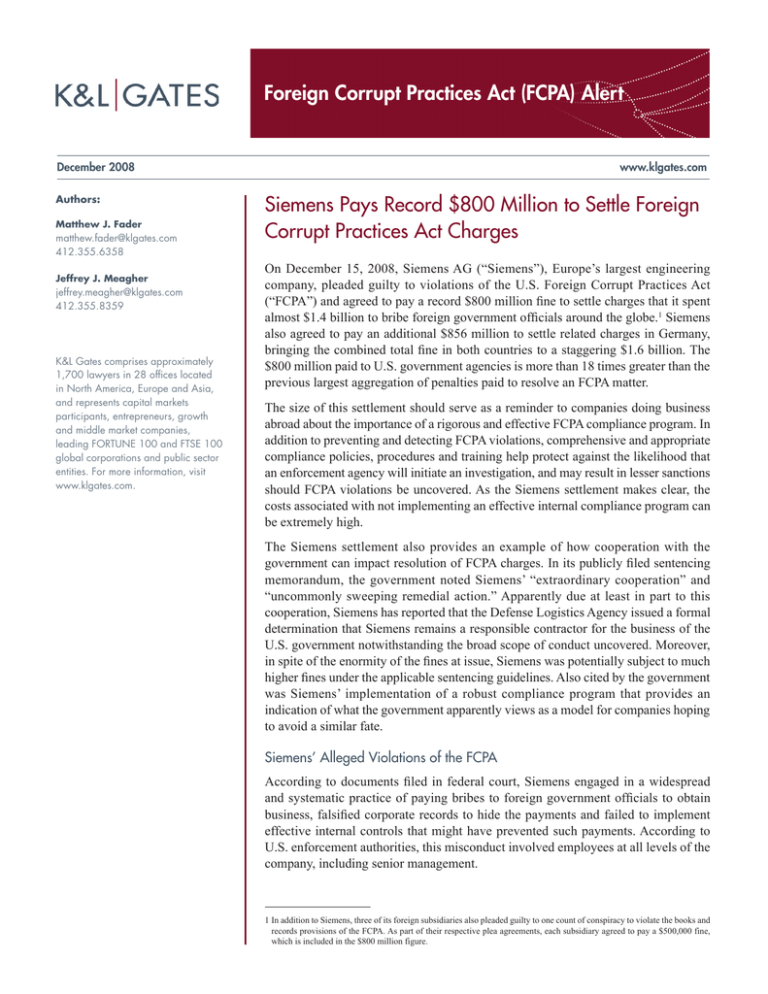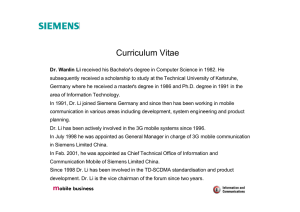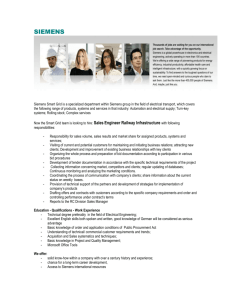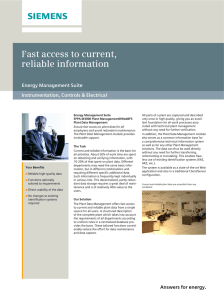
Foreign Corrupt Practices Act (FCPA) Alert
December 2008
Authors:
Matthew J. Fader
matthew.fader@klgates.com
412.355.6358
Jeffrey J. Meagher
jeffrey.meagher@klgates.com
412.355.8359
K&L Gates comprises approximately
1,700 lawyers in 28 offices located
in North America, Europe and Asia,
and represents capital markets
participants, entrepreneurs, growth
and middle market companies,
leading FORTUNE 100 and FTSE 100
global corporations and public sector
entities. For more information, visit
www.klgates.com.
www.klgates.com
Siemens Pays Record $800 Million to Settle Foreign
Corrupt Practices Act Charges
On December 15, 2008, Siemens AG (“Siemens”), Europe’s largest engineering
company, pleaded guilty to violations of the U.S. Foreign Corrupt Practices Act
(“FCPA”) and agreed to pay a record $800 million fine to settle charges that it spent
almost $1.4 billion to bribe foreign government officials around the globe.1 Siemens
also agreed to pay an additional $856 million to settle related charges in Germany,
bringing the combined total fine in both countries to a staggering $1.6 billion. The
$800 million paid to U.S. government agencies is more than 18 times greater than the
previous largest aggregation of penalties paid to resolve an FCPA matter.
The size of this settlement should serve as a reminder to companies doing business
abroad about the importance of a rigorous and effective FCPA compliance program. In
addition to preventing and detecting FCPA violations, comprehensive and appropriate
compliance policies, procedures and training help protect against the likelihood that
an enforcement agency will initiate an investigation, and may result in lesser sanctions
should FCPA violations be uncovered. As the Siemens settlement makes clear, the
costs associated with not implementing an effective internal compliance program can
be extremely high.
The Siemens settlement also provides an example of how cooperation with the
government can impact resolution of FCPA charges. In its publicly filed sentencing
memorandum, the government noted Siemens’ “extraordinary cooperation” and
“uncommonly sweeping remedial action.” Apparently due at least in part to this
cooperation, Siemens has reported that the Defense Logistics Agency issued a formal
determination that Siemens remains a responsible contractor for the business of the
U.S. government notwithstanding the broad scope of conduct uncovered. Moreover,
in spite of the enormity of the fines at issue, Siemens was potentially subject to much
higher fines under the applicable sentencing guidelines. Also cited by the government
was Siemens’ implementation of a robust compliance program that provides an
indication of what the government apparently views as a model for companies hoping
to avoid a similar fate.
Siemens’ Alleged Violations of the FCPA
According to documents filed in federal court, Siemens engaged in a widespread
and systematic practice of paying bribes to foreign government officials to obtain
business, falsified corporate records to hide the payments and failed to implement
effective internal controls that might have prevented such payments. According to
U.S. enforcement authorities, this misconduct involved employees at all levels of the
company, including senior management.
1 In addition to Siemens, three of its foreign subsidiaries also pleaded guilty to one count of conspiracy to violate the books and
records provisions of the FCPA. As part of their respective plea agreements, each subsidiary agreed to pay a $500,000 fine,
which is included in the $800 million figure.
Foreign Corrupt Practices Act (FCPA) Alert
Court documents detail alleged bribes to government
officials in 10 countries, including corrupt payments
related to transit systems in Venezuela, high voltage
transmission lines in China, power plants in Israel,
telecommunications projects in Bangladesh and
Nigeria, national identity cards in Argentina, traffic
control systems in Russia, medical equipment in
Vietnam and refineries in Mexico. Prosecutors
also allege that Siemens paid kickbacks to Iraqi
ministries in connection with sales of power stations
and equipment in Iraq under the United Nations Oil
for Food Program.
According to U.S. authorities, Siemens employed
a variety of methods to conceal these bribes,
including the use of off-books accounts, sham
consulting contracts and inter-company accounts
to make corrupt payments. Prosecutors also allege
that Siemens generated false invoices to justify
corrupt payments, maintained “cash desks” where
employees could withdraw large sums of cash for
bribes with little documentation and used removable
Post-It notes with affixed signatures to conceal the
identity of the signors and obscure the audit trail.
Although Siemens executives did not directly
participate in any of these activities, court documents
allege that they helped create a corporate culture in
which bribery was tolerated and even rewarded
at the highest levels of the company. Specifically,
prosecutors allege that senior management failed
to adopt meaningful compliance measures, refused
to commit adequate resources to enforce existing
compliance programs and ignored repeated “red
flags” indicating that bribery was widespread within
the company. Among other things, prosecutors
cite the fact that Siemens did not issue mandatory
companywide controls regarding the use of thirdparty business consultants, failed to establish
effective internal controls over off-books accounts
and cash disbursements, did not adequately discipline
employees engaged in bribery and other misconduct
on behalf of the company and failed to implement
mandatory FCPA compliance training. According to
U.S. authorities, these failures “demonstrated a tone
at the top of Siemens that was inconsistent with an
effective FCPA compliance program.”
Siemens’ Settlement
Under its settlement agreement with the Department
of Justice (“DOJ”) and the Securities and Exchange
Commission (“SEC”), Siemens agreed to plead
guilty to criminal violations of the FCPA’s internal
controls and books and records provisions. As part
of the settlement, Siemens agreed to pay a criminal
fine of $450 million to the DOJ and $350 million
in civil damages to the SEC. Siemens also agreed
to implement rigorous compliance enhancements
and retain an independent compliance monitor for
four years.
The combined $800 million settlement is the largest
monetary sanction ever imposed under the FCPA.
The previous record penalty was $44 million, levied
last year against a subsidiary of Houston-based oil
services company Baker Hughes Inc.
Although the penalties levied against Siemens are
high, the public filings indicate that they reflect
a significant credit for Siemens’ “extraordinary
cooperation” and “uncommonly sweeping remedial
action.” Court documents reveal that Siemens faced
a criminal fine as high as $2.7 billion under the
Federal Sentencing Guidelines, as compared to the
$450 million agreed fine, but prosecutors argued for
the lower amount, in part because Siemens provided
“extraordinary” cooperation in connection with
the investigation of its past corporate conduct and
made an “extensive commitment” to overhaul its
compliance program.
Siemens’ “Extraordinary” Cooperation
According to court documents, Siemens disclosed
the existence of potential FCPA violations to the
DOJ and SEC and initiated a sweeping internal
investigation shortly after German authorities raided
several Siemens offices and the homes of several
Siemens employees in November 2006. At the outset
of the investigation, Siemens hired an independent
investigator, instituted a worldwide data preservation
policy and undertook a massive effort to collect
documents and interview relevant employees and
third parties around the world. As described in DOJ’s
sentencing memorandum, this effort involved more
than 1.5 million hours of billable attorney time, an
December 2008 | 2
Foreign Corrupt Practices Act (FCPA) Alert
independent investigation involving more than 100
outside attorneys and an additional more than 100
legal staff, more than 130 forensic accountants and
support staff and the collection of over 100 million
documents at a cost of more than $100 million
dollars. Siemens also designed and implemented
a companywide amnesty program to facilitate the
investigation that, according to court documents,
yielded “impressive results.” Siemens then provided
government investigators with periodic reports
on the status of the investigation and information
obtained from interviews, corporate records and
financial records, including significant information
regarding individuals who were used as conduits
to conceal corrupt payments made to foreign
government officials.
Siemens’ Remedial Actions
According to prosecutors, Siemens also made an
“extensive commitment to restructure and remediate
its operations to make it a worldwide leader in
transparent and responsible corporate practices.”
Among other things, Siemens replaced nearly all
of its top leadership, terminated members of senior
management implicated in the misconduct and
reorganized the company to be more centralized
from both a business and compliance perspective.
Siemens also imposed a moratorium on entering
into new business consulting agreements or making
payments under existing business consulting
agreements until it could conduct a complete
review of any such agreements and the third parties
involved. According to court documents, this has
resulted in a significant reduction in the number of
business consultants used by Siemens.
Siemens also overhauled and greatly expanded its
compliance organization. According to prosecutors,
control and accountability are now vested in a Chief
Compliance Officer who reports directly to the
General Counsel and the Chief Executive Officer.
The Audit Department is now headed by a newly
appointed Chief Audit Officer who reports directly to
the Audit Committee. Siemens also enacted a series
of new anti-corruption policies, including a new
anti-corruption handbook, sophisticated web-based
tools for due diligence and compliance matters,
a new computer-based system for review and
approval of agreements with business consultants, a
confidential communications channel for employees
to report irregular business practices and a corporate
disciplinary committee to impose appropriate
disciplinary measures for substantiated misconduct.
In addition, Siemens increased corporate-level
control over company funds and centralized and
reduced the number of company bank accounts
and outgoing payments to third parties. Finally,
Siemens organized a working group devoted to fully
implementing the new compliance initiatives.
The Take-Away
The Siemens settlement should serve as a reminder
to companies doing business abroad about the
importance of a rigorous and effective FCPA
compliance program. Companies doing business
in foreign countries, particularly companies that do
business in countries with a history of corruption,
would be well advised to reevaluate their internal
compliance programs in light of this settlement.
Among other things, the Siemens settlement shows
the need for companies to:
• I mplement effective anti-corruption policies,
controls and training for employees, agents and
representatives involved in overseas transactions,
including setting the tone of compliance starting
at the highest levels of management;
• Perform due diligence on foreign business partners,
agents, representatives and transactions before
going forward with a transaction;
• Be prepared to walk away from a prospective
transaction when there is evidence of corruption
or a party involved in the transaction is either
unwilling or unable to adhere to your company’s
FCPA policies; and
• E nsure that management understands the
importance of an effective compliance program,
takes an active role in communicating and
enforcing your company’s anti-corruption policies
and follows up on any “red flags.”
December 2008 | 3
Foreign Corrupt Practices Act (FCPA) Alert
K&L Gates’ FCPA Experience
With 1,700 lawyers on three continents, K&L Gates
has the breadth and depth of experience necessary to
handle the variety of complex legal/business issues
that arise under the FCPA. Our lawyers frequently
deal with FCPA issues associated with international
business transactions, conduct internal corporate
investigations into possible FCPA violations, help
organizations develop effective FCPA compliance
programs, conduct FCPA compliance training
programs domestically and abroad, and represent
clients in FCPA enforcement proceedings.
K&L Gates comprises multiple affiliated partnerships: a limited liability partnership with the full name K&L Gates LLP qualified in Delaware and
maintaining offices throughout the U.S., in Berlin, in Beijing (K&L Gates LLP Beijing Representative Office), and in Shanghai (K&L Gates LLP Shanghai
Representative Office); a limited liability partnership (also named K&L Gates LLP) incorporated in England and maintaining our London and Paris offices;
a Taiwan general partnership (K&L Gates) which practices from our Taipei office; and a Hong Kong general partnership (K&L Gates, Solicitors) which
practices from our Hong Kong office. K&L Gates maintains appropriate registrations in the jurisdictions in which its offices are located. A list of the
partners in each entity is available for inspection at any K&L Gates office.
This publication is for informational purposes and does not contain or convey legal advice. The information herein should not be used or relied upon
in regard to any particular facts or circumstances without first consulting a lawyer.
©1996-2008 K&L Gates LLP. All Rights Reserved.
December 2008 | 4





